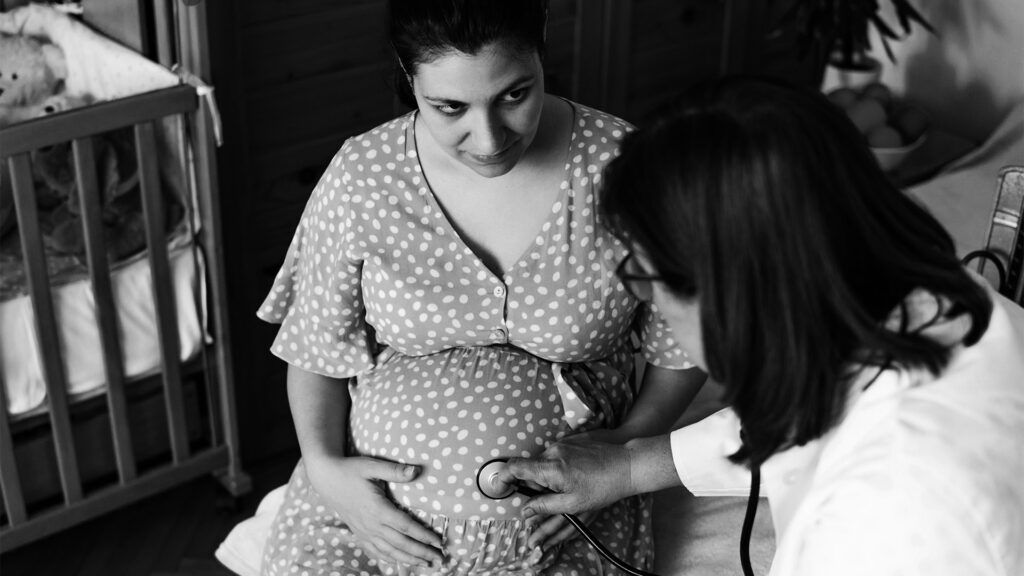A pregnant person can develop preeclampsia without having high blood pressure, but it is rare.
Preeclampsia with severe features, which some people may know as severe preeclampsia, refers to people with preeclampsia who develop severe symptoms, such as very high blood pressure or significant dysfunction of organs, such as the heart, brain, kidneys, or eyes.
People can develop preeclampsia during pregnancy or soon after giving birth. Depending on its severity, preeclampsia can cause several health complications, and it requires treatment.
This article will explain if people can have preeclampsia without hypertension, its causes, its symptoms, how doctors treat this condition, and what steps people can take to prevent it from occurring.

People who have preeclampsia
A
However, more research is necessary to understand how people develop preeclampsia without hypertension.
Doctors do not currently know the exact cause of preeclampsia. However, they think that its onset has a link to the health of the placenta, such as insufficient blood flow.
Researchers are now investigating other factors that may contribute to the development and progression of preeclampsia,
- genetic factors
- nutritional factors
- autoimmune disorders
- having a compromised immune system
- exposure to environmental factors
- hormonal imbalances
- cardiovascular and inflammatory changes during pregnancy
Being pregnant at an older age may also increase the risk of preeclampsia.
Preeclampsia occurs in
- nausea and vomiting
- headache that does not go away
- pain in the upper abdomen
- swelling of the face, hands, or feet
- difficulties breathing
- sudden weight gain
- vision changes, such as blurred vision, eyesight changes, and light sensitivity
If a pregnant person experiences any symptoms of preeclampsia, they should contact a doctor. Preeclampsia can increase the risk of serious health complications both to the pregnant person and their baby, including death.
Doctors can perform relevant tests and recommend the most appropriate management plan to reduce the risk of any health complications during pregnancy.
Doctors diagnose preeclampsia if a person has hypertension
- any sign of kidney problems
- protein in the urine, or proteinuria, suggesting impaired kidney function
- a new vision disturbances or changes
- a new headache that does not go away after taking pain medications
- elevated liver enzymes, suggesting impaired liver function
- a low blood platelet count
- presence of fluid in the lungs or pulmonary edema
If a person has a high blood pressure reading during pregnancy, a doctor may take several readings before diagnosing hypertension. This is because several factors can influence blood pressure.
Some people may need blood and urine tests to check their platelet count in the blood and protein levels in the urine to determine how well the kidneys function. Doctors may also recommend a fetal ultrasound and other tests to monitor the health of the baby and its growth.
The treatment of preeclampsia depends on its severity. If the pregnancy is at
Doctors may also prescribe magnesium sulfate or other anticonvulsive medications to prevent seizures. In some severe cases of preeclampsia, a pregnant person may need hospitalization for close monitoring and appropriate treatment of the fetus.
Treatment in the hospital may include:
- intravenous medications for managing blood pressure
- steroid injections to speed up the development of the lungs in the baby
- medications for preventing seizures and other health complications
Some people
A person with preeclampsia is more likely to have hypertension and has twice the risk of having a stroke or heart disease than a person without this condition. Having preeclampsia also increases the risk of developing diabetes in the future.
Having preeclampsia during one pregnancy also increases the risk of it reoccurring during future pregnancies.
Babies born from people who have had preeclampsia may have a higher risk of developing coronary artery disease, hypertension, and other chronic illnesses during their adult life.
However, having preeclampsia does not mean that a person or their baby will automatically develop health complications later in life.
Doctors may recommend that people with a high risk of preeclampsia take a low dose of aspirin after 12 weeks of pregnancy to reduce the risk of developing this condition.
Leading a healthy lifestyle and managing body weight and blood pressure before becoming pregnant may also reduce the risk of preeclampsia.
Preeclampsia is a condition people can develop during pregnancy or soon after. A common symptom of preeclampsia is high blood pressure and the presence of protein in the urine. However, some people may develop preeclampsia without hypertension.
Any pregnant person who experiences any symptoms of preeclampsia should see a doctor for treatment. Although this condition can lead to health complications, this is not always the case.
